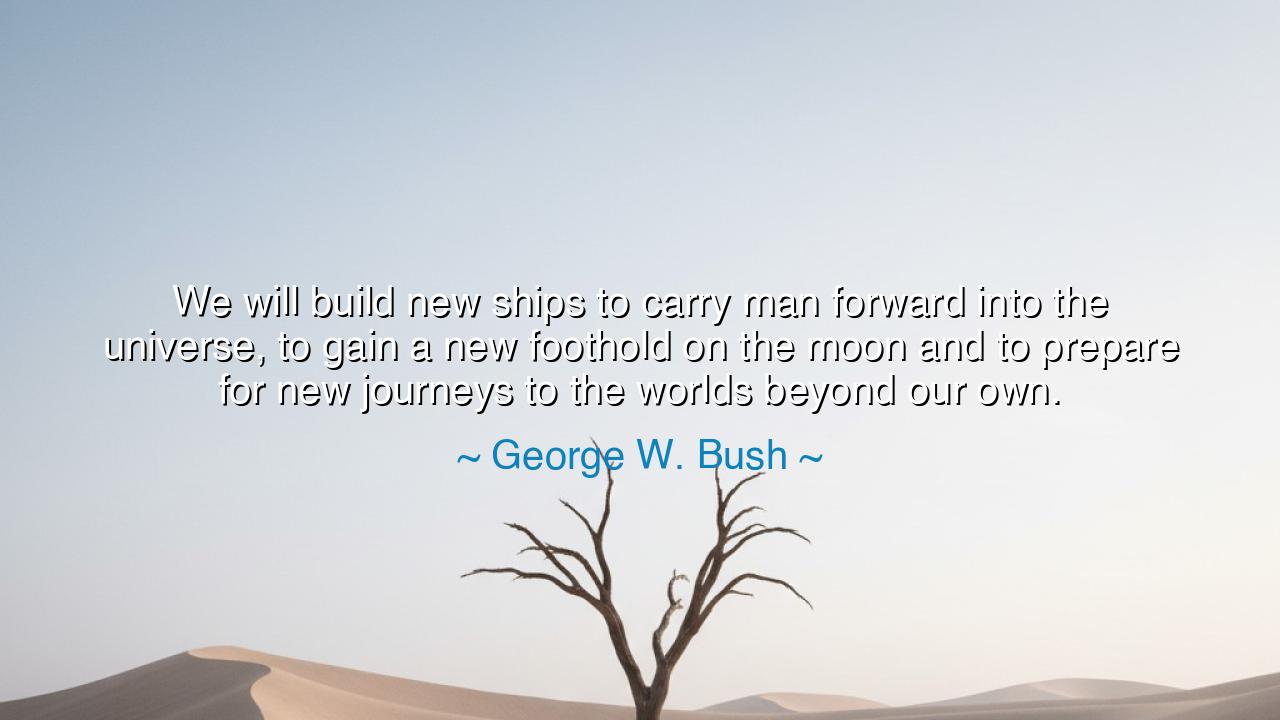
We will build new ships to carry man forward into the universe
We will build new ships to carry man forward into the universe, to gain a new foothold on the moon and to prepare for new journeys to the worlds beyond our own.






In the grand tapestry of human history, there are moments that define the very essence of our existence. These moments shape the course of civilizations and ignite the fires of imagination and ambition. One such moment came when George W. Bush, a leader of the modern world, spoke of the future of mankind's journey into the cosmos. His words were bold, full of promise and vision: "We will build new ships to carry man forward into the universe, to gain a new foothold on the moon and to prepare for new journeys to the worlds beyond our own." These words reflect not just the hope of his time, but a call to action that has echoed through the ages, urging us to look beyond the boundaries of our world and set our sights on the stars.
Humanity, in its deepest core, has always been a creature of curiosity, of exploration. From the earliest tribes, who ventured out of the caves and across vast lands, to the seafarers of the Age of Discovery, we have always sought to reach beyond the familiar, to expand the horizons of what is known. Christopher Columbus embarked on his fateful journey not because he was forced, but because he believed the world was far greater than what he could see. His ships, crude though they were by modern standards, carried him and his crew toward the unknown, driven by a vision that saw the edge of the world not as a barrier, but as an invitation. His courage to embark on a journey to a world he had never seen laid the foundation for the expansion of civilizations, just as Bush's vision of new ships to carry mankind to the moon and beyond aims to expand the very possibilities of human life.
To go to the moon, as Bush speaks of, is not just a technical endeavor. It is a declaration that the human spirit refuses to be bound by the gravity of the Earth, that we are destined to reach for the stars. The Apollo missions of the 1960s demonstrated this same spirit. When Neil Armstrong took that first step onto the lunar surface, he did not just step onto a new world—he stepped into the future of humanity. His words, “That’s one small step for man, one giant leap for mankind,” still resonate today, for they embody the idea that our greatest achievements come not from staying grounded, but from venturing into the unknown, from building new ships to carry us forward into the vastness of the universe.
The words of George W. Bush echo the call of the ancient explorers who dared to venture into the sea, not knowing what lands they would find. But just as those sailors of old built ships to conquer the oceans, so too will we build new ships to conquer the heavens. The quest for new journeys to the moon and beyond is not only about reaching new worlds—it is about preparing humanity for what lies ahead, about ensuring that we do not remain static, trapped in the familiar confines of our Earth. The ships that will carry us beyond the bounds of our world are not merely vessels of steel and fuel; they are the vessels of hope, the vessels of human potential, carrying us into the next chapter of our collective story.
Consider, too, the ancient Romans, whose legions built roads and ships to expand the empire across vast lands. They understood that in order to truly flourish, in order to grow beyond the walls of their cities, they must reach out, they must conquer the unknown and make it their own. While their pursuits were more grounded in power, their understanding of expansion mirrors the vision that Bush articulates—one of reaching beyond the known, not just to conquer, but to learn, to understand, and to grow as a species. In the same way, our journey to the moon and beyond is not just an exercise in conquest, but in discovery—a discovery that will teach us about the universe and about ourselves.
The lesson here is both simple and profound: humanity’s future lies in our ability to build the ships—both literal and figurative—that will carry us forward. Just as the ancients built roads, ships, and empires to expand their reach, so must we build new ships to expand our reach into the cosmos. Exploration is not merely an external journey; it is an internal one as well. It is a journey of the spirit, of the mind, and of the heart. We are not defined by the boundaries of our world, but by the boundaries of our imagination, by the courage to venture into the unknown, and by the wisdom to learn from the worlds we encounter.
So, as we look to the future, let us take to heart the vision of George W. Bush, and the call of all the explorers who came before us. Let us build the ships that will carry us to the moon, to the stars, and to the worlds beyond. But let us also build the ships within us—the ships of courage, of curiosity, and of vision—that will carry our spirit and our humanity as we voyage into the vast and mysterious expanse of the universe. For it is not the ships themselves that matter most, but the journey they carry us on—the journey of discovery, of growth, and of limitless potential.






AAdministratorAdministrator
Welcome, honored guests. Please leave a comment, we will respond soon